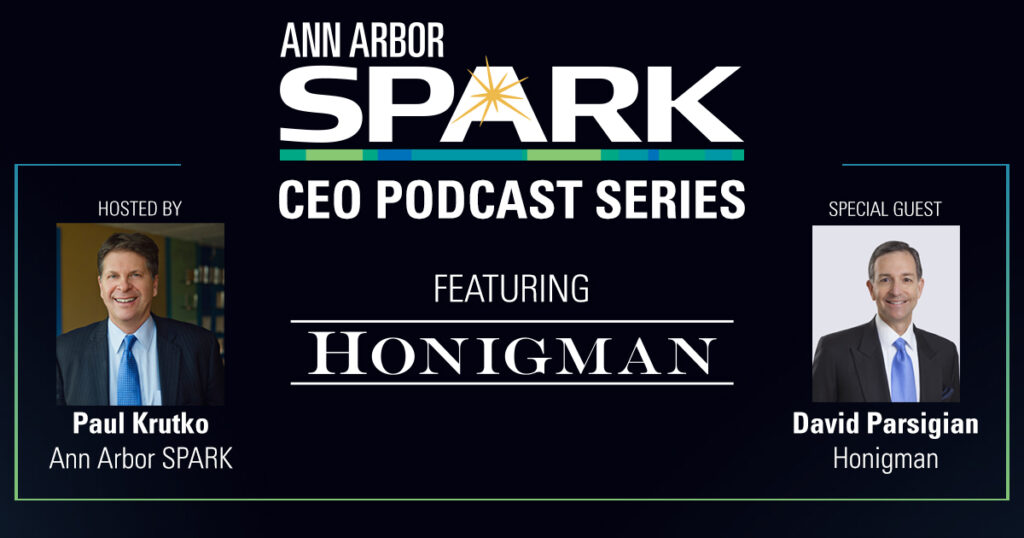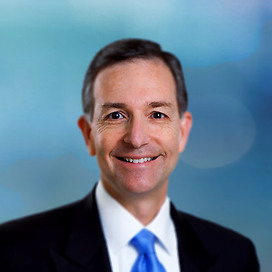
In this episode, host Paul Krutko welcomes David Parsigian, former chair of Ann Arbor SPARK and co-managing partner at Honigman LLP. Parsigian discusses his involvement with SPARK since its inception, highlighting its growth and impact over the past two decades. He emphasizes SPARK’s role in providing early-stage funding for startups, which has been critical in making entrepreneurial activity a permanent part of the region’s economy.
READ INTERVIEW
Paul Krutko: Welcome to Ann Arbor SPARK’s CEO podcast, Conversations on Economic Opportunity. My name is Paul Krutko and I’m the president and CEO of Ann Arbor SPARK.
In celebration of Ann Arbor SPARK’s 20th anniversary, we’re going to have a series of podcast episodes with our past chairpersons of the SPARK Board of Directors. Each will share their unique perspectives on SPARK’s impact over the past two decades, proud moments during their tenure, and their thoughts on the future of the Ann Arbor region.
Today we welcome back David Parsigian, co-managing partner at Honigman LLP and immediate past chair of Ann Arbor SPARK. David was chair from 2018 to 2021 and was a member of the board from our very beginning in 2004. He’s a renowned venture capital and mergers and acquisitions lawyer specializing in corporate securities and finance law with extensive experience in leading high technology and growth equity investment activities for corporations and institutional venture and private equity firms.
David, thanks so much for taking some time to go down memory lane with us today.
David Parsigian: It’s my pleasure.
Paul: So what was your initial involvement with SPARK and what motivated that involvement? Well,
David: First let me say, Paul, it’s my pleasure to be here and to help celebrate SPARK’s 20th anniversary. It’s hard to believe that so much time has passed and how much SPARK has grown and accomplished for this community during that time. In my view, it’s gone way beyond our original expectations those many years ago when a few community leaders, including former governor Rick Snyder, launched the organization with the goal of better supporting our growing entrepreneurial community while continuing the longstanding efforts of the Washtenaw Development Council that SPARK succeeded.
I was very fortunate to be asked to do the legal work necessary to create SPARK by those community leaders, particularly Marvin Parnes of the University of Michigan, with whom I had worked on a number of community initiatives. Marvin worked for Zell Lurie, who was then the vice president for research at U of M. As you well know, the U of M was a driving force behind SPARK and continues to be among its key supporters. The U of M was looking for a platform to help the many startups that were being founded based on the massive volume of research that occurs at the university. As part of that work, I was asked to join the SPARK Board and serve as its general counsel, both experiences that have been important to my career and provided me with the opportunity to interact with many people that I might not otherwise have encountered.
Paul: Yeah, thanks for sharing that because I remember when I first came, Marvin was still involved at that time from the university. So yeah, you made me remember somebody in particular, so I appreciate that.
Do you have a particularly memorable SPARK experience or project that stands out to you?
David: Well, there are many experiences of course, but I would point to two initiatives of SPARK that I think have been particularly impactful to the community.
The first is the early stage funding for startups that began with the pre-seed funding programs funded by the Michigan Economic Development Corporation, and that SPARK has been able to continue with returns from those early investments and further government source funding. Among the motivators for the founding of SPARK was the lack of early stage capital, which was a serious challenge to the vibrancy of an entrepreneurial ecosystem that the founders of SPARK were seeking to address. While the private sector funding and profile of the Midwest in general, and Michigan in particular as a spawning ground for new companies has definitely improved over the 20 years that SPARK has been in existence, the dearth of early stage capital in those early days was holding us back.
The pre-seed funding program allowed SPARK to identify and provide funding sufficient to allow these startups to get off the ground and grow enough to then be able to attract institutional venture capital. The momentum that program was created put Michigan on the venture capital map, and although we may never be as focused on technology-based startups as a place like Silicon Valley, I do believe that the pre-seed funding program has been critical to making entrepreneurial activity a key and permanent part of our economy.
The second initiative that comes to mind occurred when I was chair at SPARK. That initiative was the role that SPARK played in helping to keep all kinds of businesses alive during COVID. SPARK leadership and staff identified the need and proactively stepped in to manage and distribute available public and private funding in a way that no other local organization could have without SPARK. Many businesses that are part of the fabric of our community would likely have failed and changed that community forever.
Paul: Thanks. What are some key lessons you’ve learned from your experience with SPARK that you believe are valuable for future leaders?
David: SPARK is a platform for convening leaders in the business, local government, academic, and entrepreneurial communities, without which they might never have understood the different challenges that each faces and work together to address those challenges. In doing so, they improved not just the local ecosystem, but also were helping to solve some of their own problems. I would also say that the dedicated leadership and staff over these many years have taught all of the community leaders participating in SPARK what skilled economic development professionals can help achieve, which is significant and without whom would not have been possible.
Paul: Well, how do you, thinking back, how do you assess SPARK’s impact on the region and on the broader community?
David: Well, I think the positive impact of SPARK on our region has been very significant. It’s impossible to prove a negative, but imagine where we would be if there were no SPARK. The reality is that the business community in Ann Arbor had been shrinking, especially in the wake of Pfizer’s departure. Community efforts to keep existing businesses and attract new ones were lagging behind its peers, both statewide and nationally. SPARK reinvigorated and reorganized those efforts. It coordinated the activities of public and private stakeholders to participate in the business retention and attraction efforts in a way that put a different, more positive face on this region as a place to do business.
I believe SPARK stopped the decline and put us on the path that we are on today where Ann Arbor and its surrounding communities are back in the game when it comes to where companies consider locating.
And that is all in addition to what SPARK did for the entrepreneurial community. Not just providing funding, as I noted earlier, but also in providing consulting and other resources desperately needed by new companies to avoid mistakes and have a chance to succeed.
Paul: So part of the conversations we’re having with each of the past chairs is about the past, the last 20 years. But I want to have you take a look forward. What do you think the Ann Arbor region will look like in the next 20 years, and how do you see SPARK playing a role in that future?
David: Well, one thing I’ve learned in my career is that I’m not very good at predicting the future, but what I would say is that I suspect the Ann Arbor region will continue to grow as a good place to start and grow companies. There will always be competition from other places to keep and attract those businesses as well as other challenges. But the University of Michigan and the quality of life in this community, coupled with the coordinated efforts of SPARK, will keep us in the game. I think SPARK has been critical to firmly establishing our entrepreneurial community and will remain very important to its continued viability by serving as a hub for all of its activities and a resource for budding entrepreneurs.
Paul: So as we’re closing out our conversation today, I have two final questions. What advice would you give to future leaders of SPARK and those aspiring to make a positive impact in the region?
David: Well, I would say to all community leaders in business, government, academia, that it’s critical to get involved with SPARK and support it financially. Both those activities will provide valuable returns to them and to their institutions. I can say for my own firm, being involved in SPARK has been a very important part of our involvement in the community and frankly has brought returns for us as a business. So my advice to those community leaders is not participating in SPARK is really not an option.
Paul: Appreciate that, David. So as we close out our conversation, I guess as you reflect on your journey with SPARK, is there anything else you’d like to share or any final thoughts for our listeners?
David: I would just say, Paul, that the journey has been a very rewarding one for me. I’ve learned a lot and gotten to meet some great people among the leadership and staff and on the board as well as many who have been served by SPARK.
I was honored and privileged to serve as the chair of the SPARK Board and to participate in some key community initiatives that would not have been opportunities for me, but for SPARK, perhaps key among them being the American Center for Mobility, which is really now an important part of our ecosystem. SPARK has certainly been a big part of my professional life for this past 20 years, which would’ve been diminished without the experiences it provided. I look forward to watching SPARK continue to grow and flourish for the next 20 years and beyond.
Paul: Well, David, thank you for the invaluable amount of time and energy you’ve devoted to SPARK’s success. I know personally, just taking a moment there, you and I have worked on a number of very challenging and complex issues. We are continuing to do that, and I’ve always appreciated your support and your advice and counsel, and look forward to that in the future.
David: Well, thanks Paul. It’s been my pleasure and it’s been great to work with you and learn as much as I have, which is a lot about economic development and about coordinating disparate groups of people for positive change.
Paul: Well, again, thank you for taking some time with us today. I want to thank our audience for listening and learning more about those leaders and organizations working hard to create the Ann Arbor Region’s economic future. These conversations are brought to you by Ann Arbor SPARK. You can find more information about Ann Arbor SPARK on Facebook, Instagram, and LinkedIn.
David Parsigian’s Bio
David Parsigian is a nationally known venture capital and mergers and
acquisitions lawyer. He represents emerging technology companies and
their funding sources from inception through exit, and has served as lead
counsel for investment transactions aggregating over $5 billion. He has been
recognized as by Chambers USA: America’s Leading Lawyers for Business
since 2006 and been an adjunct professor at the University of Michigan Law
School. Mr. Parsigian has served on many community boards and as Chair
of each of the Washtenaw Community College Foundation, the Ann
Arbor/Ypsilanti Chamber and Ann Arbor SPARK.
